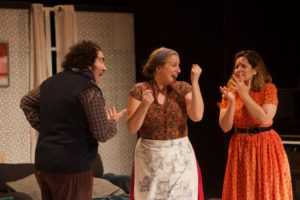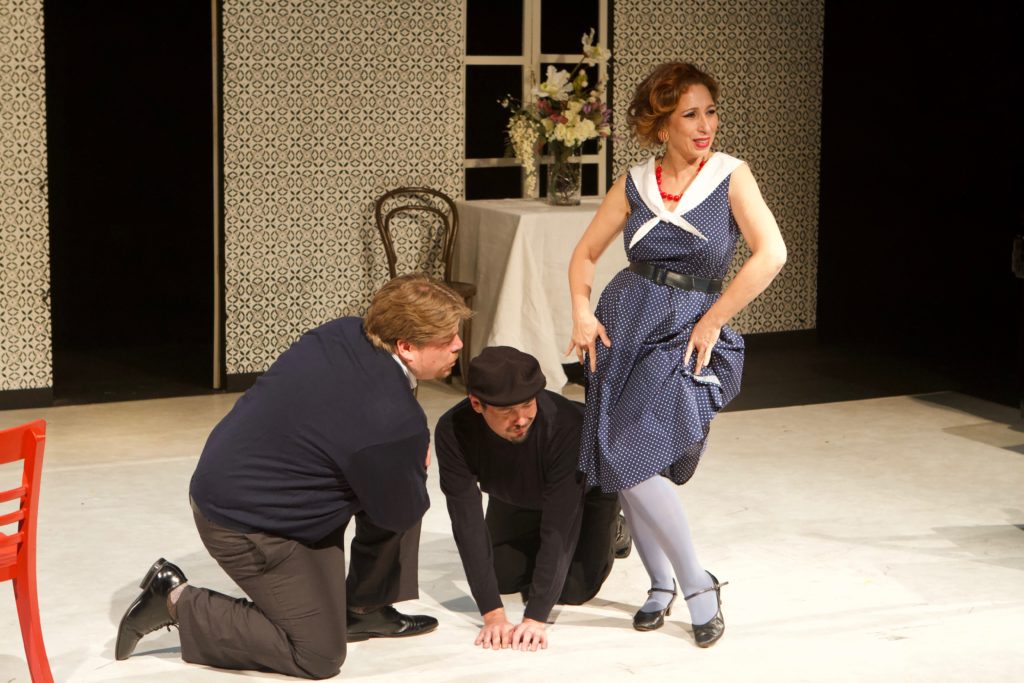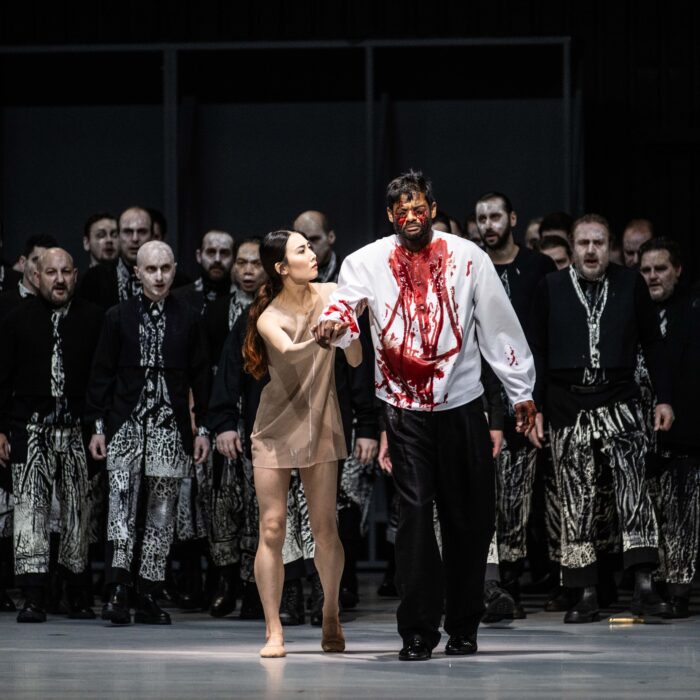
New Camerata Opera 2019-20 Review: El Barbero De Sevilla
By David Salazar(Credit: Erik Bagger)
Once upon a time, zarzuela had a prominent history in New York City. Through the efforts of René Buch at Repertorio Español and Silvia Brito’s efforts at Teatro Thalia in the 1980s, as welll as other performances in the late 90’s and early 2000s, zarzuela was part of the cultural life in the big city.
But as music director Pablo Zinger, who was a part of that history, noted in the program notes and in his opening night speech for “El Barbero de Sevilla” at the Teatro LATEA, the last 20 years have not been as kind to the art form in New York.
In fact, Spanish-language opera is an oddity in New York City, with the exception of some companies, including the New York City Opera, making an effort to give the increasingly essential language in American culture a proper operatic voice. And using Zinger’s words, the Spanish language in the classical music world is seen as “exotic” in comparison to Italian, French, and German.
New Camerata Opera, one of the major players in the independent opera scene in the melting pot city, has slowly but surely been vocal about creating inclusive programs in their seasons. Last year, the company put on “Leading Ladies Liberated” to highlight the compositions of famed female composers and singers. The company has also showcased rare classics and some unique modern operas. With “El Barbero de Sevilla,” the company is championing an art form that still needs more exposure and presentations in the entire U.S.
This particular production, directed by Rod Gómez, is an important, bold, and greatly appreciated step, though the result on opening night was often a mixed bag.
Jokes Not Landing
The zarzuela by Gerónimo Giménez and Manuel Nieto presents some dramatic challenges. Elena wants to be a star opera singer and has the support of her mother and teacher. But her father is firmly against show business because he is having an affair with a famous soprano and presumably would be afraid of having his two lives collide. Of course, that is exactly what happens. But when it does, everyone reconciles in about five minutes and the zarzuela comes to an end with father allowing his daughter to pursue her dreams. At a little over an hour and 10 minutes, the story itself feels like it ends when it could just be getting started, ultimately feeling underdeveloped.
Gómez’s approach seemed to be the path of least resistance with the characters mugging for the audience and playing up the cartoonish aspects of the story. Of course, this generated a sense of predictability that made a lot of the major comedic moments fall flat, generating little to no audience response. A lot of it came down to casting and acting abilities amongst the cast, with some members digging into the cartoony qualities while others seeming to attempt a different style that only added to the awkwardness of the interactions. This was most visible in the initial scenes that establish the major players of the story, sandwiched between the opening trio and the lovers’ duet a few scenes later.
Throw in the Spanish-English language split and the experience got all the more jarring at times; particularly during musical sections, some of the cast members overemphasized their consonants in contrast with their Spanish-speaking colleagues, blurring the overall flow and cohesion of the language within the music.
The cast did progressively get stronger as the night wore on with the final scene ultimately working best from a comedic standpoint, especially as all the paths start criss-crossing.
The least predictable moments often resulted in the greatest comedy. At one point, Costas Tsourakis, playing Elena’s teacher Bataglia, narrated how he talked to an impresario to get her the job. As he impersonated the impresario, he took on the voice of a president-who-shall-not-be-named, hand gestures and all; cartoony as it was, it was also one of the most genuine moments of comedy the entire evening.
Gómez must also be commended for his blocking of the famed “Me llaman la primorosa” in which Elena flirts with her boyfriend Martín while dealing with her mother’s interference.
Intimate Musical Setting
Zinger arranged Giménez and Nieto’s music for piano, violin, cello, bass, and winds, creating a suitably intimate atmosphere. The reduced instrumentation also brought out the score’s bounteous opera references, which is likely one of the reasons this particular score was a solid choice for an audience that loves opera but barely knows zarzuela. The ensemble managed solid unity throughout, though as with smallest ensembles, some lack of cohesion will be more exposed.
During the first interlude, the ensemble took on an arrangement of “Di provenza il mar” from “La Traviata,” with the melody starting on cello, moving on to violin, and concluding with the winds. The cellist performed the line with a detached phrasing that sounded quite jagged, especially when contrasted with the phrasing by the violin and winds; this is an iconic melody and the discrepancy in phrasing took you right out of the flow of the moment and stood out as the lone major instance in which this fantastic ensemble was not on the same page.
One of Zinger’s big masterstrokes in this arrangement was to end the show with two iconic arias from Rossini’s “Il Barbiere di Siviglia.” The show is constantly referenced throughout the opera with many musical quotations in ensembles. But most productions end right when Elena’s blessing. To have “Largo al factotum” and “Una voce poco fa” closing out the night gives the entire show a solid payoff. In both of these iconic arias, Zinger and the ensemble were fantastic collaborators, giving their soloists ample space to showcase their vocal bravura.

(Credit: Erik Bagger)
Three Standouts
As Elena, María Brea showcased a fantastic soprano, particularly in her high range. She gets the zarzuela’s most famed number “Me llaman la primorosa,” which she pulled off with incredible precision and ease. The phrases sounded easy in her voice, with each elegantly woven into the next, the leaps to the high notes often approach with a splendid portamento that only added to the luxurious polish that she imbued. This aria is supposed to showcase Elena’s virtuosity as a singer and there was no doubt that she did just that in this particular selection. Her soprano soared wonderfully in ensembles, with the opening trio another example of her vocal presence. At one point Elena must practice some scales, giving Brea her first opportunity to showcase the flexibility of her voice; she managed these runs with ease, adding some comic touches with her body language.
She delivered a solid “Una voce poco fa,” her voice solidly grounded in the opening section of the aria. “Io sono docile” didn’t start off as comfortably with the soprano seeming a bit out of breath during some of the coloratura runs and even falling slightly behind, but she managed to put it all together in the second half and finish off the evening with a triumphant high note over the vocal ensemble.
Mezzo-soprano Anna Tonna played the diva La Roldán, who gets one major musical moment to really showcase why she is a powerhouse diva in the story. At the start of the aria, La Roldán sings about how clear and polished her singing is, and that description could not have been more accurate of Tonna’s own voice. Every pitch was precise and every phrase flowed luxuriously. But what was most enjoyable about her performance of this particular passage was the clarity of her text and how it fit perfectly into the musical language. As evidenced in other performances, this is undeniably one of Tonna’s strengths and it allows for a immersive experience of her singing that not all singers possess. This was only furthered by her stage presence. While there is no denying that the direction of this character was one-note, but Tonna, while maintaining that truth on stage, never felt exaggerated or over-the-top in her execution.
Baritone José Luis Maldonado was undeniably the vocal standout of the night with some truly magnificent moments. He blended beautifully with Brea in their duet and let his sound ring in the small hall during ensembles. But his big moment was undeniably during “Largo al factotum” where he delivered a veritable scene stealer to remember. Every word was crystal clear with the high notes, especially the high Gs, resplendent and simply riveting (in this regard, the final two high Gs sounded even stronger and more present than the initial one). He also displayed tremendous agility in his voice with the rapid fire sections at the coda of the piece.
Comic Gems
Speaking of rapid-fire, tenor Victor Khodadad and baritone Brian Alvarado pulled off their pattering duet quite well and also managed to imbue some strong humor as feuding critics Pérez and López.
Speaking of humor, no one was stronger than Tsourakis who showed tremendous physical versatility as Bataglia. In addition to his “presidential” moment, he was hilarious playing the piano during “Me llaman la primorosa,” his body releasing a lot of energy on the piano. Not to be overlooked was his incredibly resonant bass, which had a natural bloom to it in the ensembles.
Caroline Tye seemed to get stronger and stronger as the performance developed, really chewing into her role as Elena’s overprotective mother Casimira. She also displayed a hefty chest voice that added much needed vocal contrast, making her a musical standout in this regard.
Stan Lacy, as Elena’s father Nicolás, and Jay Lucas Chacón, as Benito, had solids outing with many of the work’s jokes resting on their shoulders. Their initial exchanges didn’t quite work as the two seemed at odds with their approaches, but as the night developed, they found their footing and really dug into the nature of the production, creating some fun comic moments. They were solid complements in the ensembles, not getting any solo numbers of their own.
The audience warmed to the performance as the night wore on, with laughter more audible near the end. When it all came to a close, there was a general excitement in the air. And there should be. Even if the performance wasn’t always clicking on all cylinders, this production choice was a big win for New Camerata Opera and those involved.
With the biggest opera companies in New York essentially ignoring the Spanish-speaking community with its repertory selection, independent companies have an opportunity to fill that gap and provide platforms for cultures that are a major part of the infrastructure of this city, and country.
New Camerata not only made that happen with “El Barbero de Sevilla,” but showed strong leadership amidst the New York opera community in doing so.


